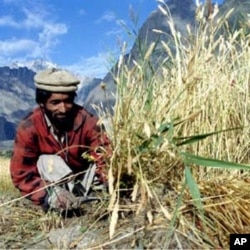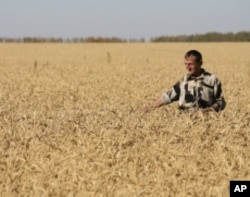The head of the World Bank says a sharp rise in food prices has pushed 44 million people into extreme poverty. World Bank President Robert Zoellick is calling on the Group of 20 leading and emerging economies to put food first on its agenda.
The World Bank's latest food price index is just three percent below its 2008 peak. Wheat and maize prices have gone up about 75 percent since last June. According to report, wheat increased 54 percent in Kyrgyzstan, 45 percent in Bangladesh, 37 percent in Tajikistan, 33 percent in Mongolia, 31 percent in Sri Lanka, 19 percent in Afghanistan and 16 percent in both Sudan and Pakistan.
According to Zoellick, high and volatile food prices are a key challenge in the developing world, where the most vulnerable people spend more than half their income on food.
"Even before these latest price hikes, there were already more than 900 million people going hungry each day," he says. "Now, with an estimated 44 million more people living in extreme poverty, it shows this year is shaping up to be a very tough year for the chronically malnourished."
This year is not as bad as 2008, when prices hit record highs. That's because grain stocks are somewhat larger, maize harvests in Africa were good, and rice prices have not risen as much as other grains. But Zoellick says the upcoming growing season will be especially important.
"We already are in stress points in a number of markets. If this trend continues, if we don't get a relief on the weather side, then I foresee conditions getting worse. And, mistaken policy actions such as export bans and other types of price controls will just exacerbate the problem."
Last summer, Russia banned wheat exports after a major drought. Rice export bans were blamed for worsening price spikes in 2007 and 2008 that led to some food riots.
Speaking ahead of this week's G-20 finance ministers meeting in Paris, Zoellick discourages export bans and called for a global code of conduct that would at least exempt humanitarian shipments from restrictions.
He believes high and unstable prices are likely to be a long-term trend, in part because of the rising demand for biofuels and the growing appetite for meat in developing countries.
"What we're now seeing is a trend punctuated by some great volatility," says Zoellick, "and the poor and vulnerable have got no cushion when the prices spike."
To help offset the problem, he's calling for global action to provide better safety nets for pregnant women and young children and to improve developing-world farmers' access to better seeds, fertilizer and markets.


















